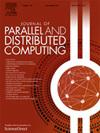Skyward secure: Advancing drone data-sharing in 6G with decentralized dataspace and supported technologies
IF 3.4
3区 计算机科学
Q1 COMPUTER SCIENCE, THEORY & METHODS
引用次数: 0
Abstract
The capacity of Dataspace enables the distribution of heterogeneous data from several sources and domains and has attracted attention for resolving data integration challenges. Drone data sharing faces challenges such as protecting privacy and security, building trust and dependability, controlling latency and scalability, facilitating real-time data processing, and preserving the caliber of shared models. Therefore, sixth-generation (6G) networks provide high throughput and low latency to improve drone operations; security issues are exacerbated by the sensitive nature of shared data and the lack of centralized monitoring. To address the challenges, this paper presents a conceptual framework for a Dataspace in the Sky to enable secure and efficient drone data-sharing within 6G networks in the transition from Industry 4.0 to Industry 5.0. The Dataspace in the Sky integrates Federated Learning (FL), a decentralized Machine Learning (ML) approach that enhances security and privacy by sharing models instead of raw data, facilitating effective drone collaboration. However, the quality of shared local models often suffers due to inconsistent data contributions and unreliable recording mechanisms, which can undermine the performance of FL. To tackle the challenges, the framework employs blockchain (BC) to decentralize and secure the Dataspace, ensuring the integrity of contribution records and improving the reliability of shared models. Dataspace in the Sky empowered decentralized data sharing which addresses latency issues by decentralizing decision-making and enhances trust and reliability by leveraging immutable and transparent BC mechanisms. The robustness of Dataspace in the Sky solution is not only secures drone-sharing operations in 6G environments but enables the development of citizen-friendly mobility services, expanding opportunities across smart environments.
Skyward secure:通过分散的数据空间和支持技术,推进6G无人机数据共享
Dataspace的容量使来自多个来源和领域的异构数据能够分布,并引起了人们对解决数据集成挑战的关注。无人机数据共享面临着保护隐私和安全、建立信任和可靠性、控制延迟和可扩展性、促进实时数据处理以及保持共享模型的质量等挑战。因此,第六代(6G)网络提供高吞吐量和低延迟,以改善无人机操作;共享数据的敏感性和缺乏集中监控加剧了安全问题。为了应对这些挑战,本文提出了一个天空数据空间的概念框架,以便在从工业4.0向工业5.0过渡的6G网络中实现安全高效的无人机数据共享。空中数据空间集成了联邦学习(FL),这是一种分散的机器学习(ML)方法,通过共享模型而不是原始数据来增强安全性和隐私性,促进有效的无人机协作。然而,由于数据贡献不一致和记录机制不可靠,共享局部模型的质量往往会受到影响,从而影响局部模型的性能。为了解决这些问题,框架采用区块链(BC)来分散和保护数据空间,确保贡献记录的完整性,提高共享模型的可靠性。Sky中的数据空间支持分散的数据共享,通过分散决策来解决延迟问题,并通过利用不可变和透明的BC机制来增强信任和可靠性。Dataspace in Sky解决方案的稳健性不仅确保了6G环境下的无人机共享操作,还使市民友好型移动服务的开发成为可能,在智能环境中扩大了机会。
本文章由计算机程序翻译,如有差异,请以英文原文为准。
求助全文
约1分钟内获得全文
求助全文
来源期刊

Journal of Parallel and Distributed Computing
工程技术-计算机:理论方法
CiteScore
10.30
自引率
2.60%
发文量
172
审稿时长
12 months
期刊介绍:
This international journal is directed to researchers, engineers, educators, managers, programmers, and users of computers who have particular interests in parallel processing and/or distributed computing.
The Journal of Parallel and Distributed Computing publishes original research papers and timely review articles on the theory, design, evaluation, and use of parallel and/or distributed computing systems. The journal also features special issues on these topics; again covering the full range from the design to the use of our targeted systems.
 求助内容:
求助内容: 应助结果提醒方式:
应助结果提醒方式:


